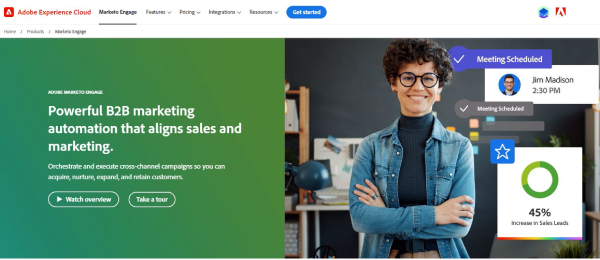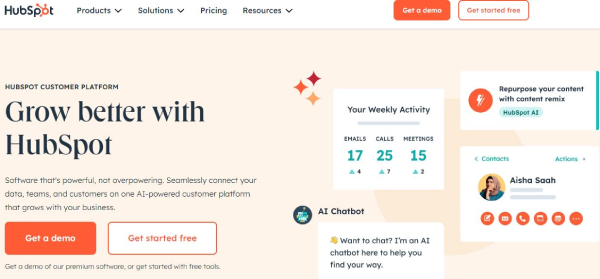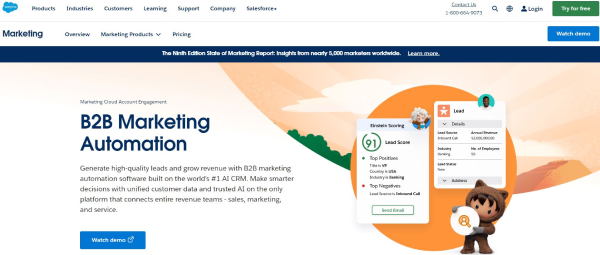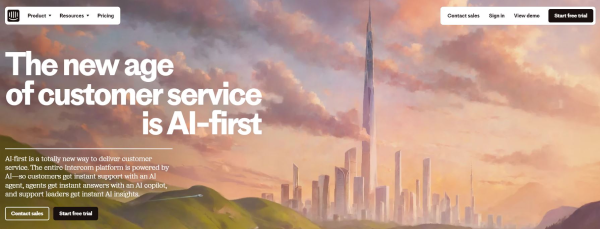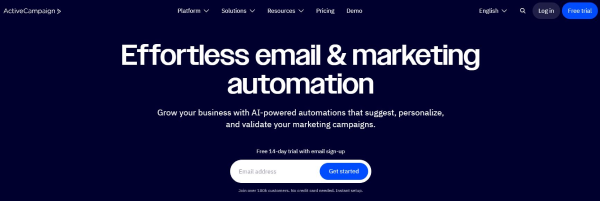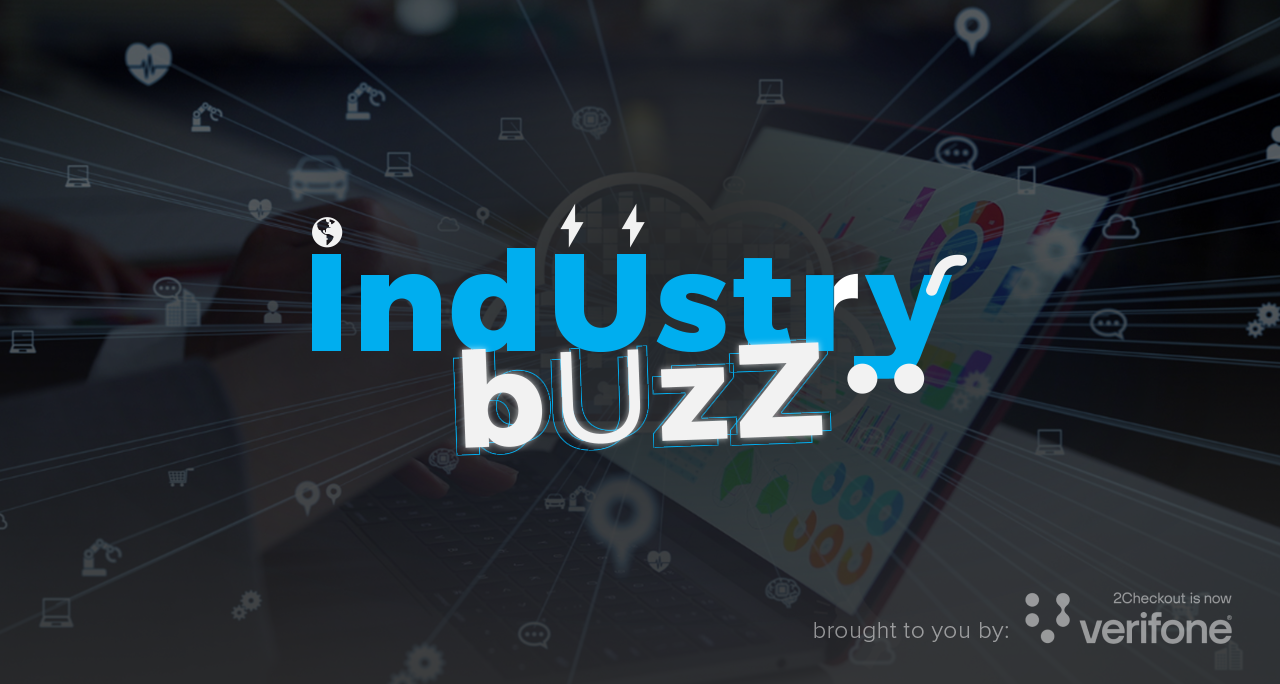Updated in August 2024
Email marketing is a proven powerhouse, but there’s even greater potential to be unlocked. Many marketers mistakenly believe that sending out a monthly newsletter is enough to nurture leads and drive conversions. The truth is that email marketing can be significantly amplified when combined with marketing automation. By understanding and responding to individual customer needs, automation transforms generic email blasts into personalized journeys that deliver exceptional results.
Discover how cutting-edge marketing automation platforms transcend traditional email marketing. We’ll explore key features that empower businesses to deliver exceptional customer experiences, nurture leads effectively and drive significant growth.
What Is Marketing Automation?
Marketing automation delivers personalized messages tailored to an individual’s actions and preferences. For example, when you log in to a service or engage with a product, it can trigger targeted communications that guide you through the customer journey—whether that’s moving you closer to making your first purchase, expanding your use, or upgrading to a higher tier.
Imagine you’ve just published a web page using a new CMS. A well-designed marketing automation system might immediately congratulate you on this achievement and follow up with tips on how to drive traffic to your page. This timely, usage-based message can enhance your success with the CMS.
BONUS: Here are 6 tactics to drive sales with SaaS email marketing.
Email marketing can miss the mark when it’s not aligned with a customer’s real-time interactions with a company. Receiving the same email twice, being invited to try a feature you’ve already used, or—worse—being prompted about a feature you needed help with but haven’t received support for, can be frustrating. Marketing automation solves this by ensuring that email and other marketing efforts are in sync with how customers actually engage with a brand, product, or service. By delivering the correct information at the right time, marketing automation enhances customer engagement and strengthens loyalty.
Selecting the Right Marketing Automation Platform
Now that we’ve defined marketing automation, the next step is choosing the right platform for your needs. Even the most advanced marketing software might not be the best fit for your specific goals.
Not every company requires the full suite of tools that a comprehensive marketing automation platform offers. In this marketing automation software comparison, we’ll guide you on what to look for in a tool that aligns with your needs.
- Triggers are essential: Look for a platform that enables you to send messages based on user interactions with your website or product, ensuring you reach users when they’re most receptive.
- Timing is crucial: Ensure your marketing automation can schedule messages at optimal times and sequence a series of communications for effective onboarding.
- Personalization is key: Choose a platform that allows you to segment users into cohorts based on characteristics and send tailored content.
- Leverage scoring: A sound system should enable you to “score” users based on their interactions with your website and product and adjust communications accordingly.
- Analytics drive improvement: Robust analytics are vital for continually optimizing your automation efforts and better serving your customers.
Comparing Marketing Automation Software
With these criteria in mind, let’s explore a few specific platforms to help you find the best marketing automation software for your needs.
-
Marketo
For instance, when talking about major service providers as Adobe, Marketo is the perfect choice. It offers a powerful and versatile suite of tools, including landing pages, drip campaigns, and comprehensive reporting. While it provides extensive functionality, it can be complex to navigate. To fully leverage its capabilities, having a dedicated team member or partnering with an agency experienced in Marketo is advisable.
-
HubSpot
On the other hand, HubSpot is a more user-friendly option. Although it has slightly fewer features, it compensates with strong integration capabilities and robust tools for blogging and landing page creation, which are key for attracting inbound leads. HubSpot also provides in-depth analytics, effective lead scoring, segmentation, and granular role management.
-
Pardot
If CRM integration is crucial, Pardot, owned by Salesforce, excels in this area. It offers a strong marketing automation system with excellent scoring options. While it may not always have the latest updates, Pardot still delivers powerful tools for automating and tracking marketing efforts, and it integrates seamlessly with other marketing tools.
-
MailChimp
For those prioritizing ease of use, MailChimp is an excellent choice, particularly for email marketing. It features list-building, deliverability assistance, and campaign management, along with simple tools for creating landing pages and tracking social ads. However, it’s not designed as a CMS or for blogging.
-
Intercom
In the realm of customer communication, Intercom stands out with its robust tools and in-app tracking, which can significantly enhance your marketing campaigns. By integrating support, sales, and marketing in one platform, Intercom helps companies better understand their customers and grow their business. It’s solid for user engagement, though it may be less focused on new customer acquisition.
-
Active Campaign
Lastly, Active Campaign offers a combination of email, automation, and sales tools to help grow your business. It provides top-tier personalization and customization options based on tags and integrates easily with other systems, enhancing overall efficiency.
Explore these rankings to learn more about the top automation tools available.
Only some companies are immediately ready for a marketing automation platform. If you have a small user base or lack a well-defined onboarding process, you might find that setting up automation could be more time-consuming than beneficial. It’s often better to begin with top-tier email marketing tools, engaging your audience with tailored, valuable content. As you gain a deeper understanding of your customers, you can gradually expand into marketing automation.
Remember, marketing automation isn’t a replacement for your marketing team—it enhances their effectiveness. By automating large, time-consuming tasks, your team can focus on fine-tuning strategies and maximizing the potential of the tools at their disposal.
Key Elements to Consider in Your Marketing Tools Review
When evaluating marketing automation and email marketing software, it’s crucial to start by considering your own needs as well as those of your customers. If you manage complex onboarding processes for multiple products across different industries, your requirements will differ significantly from those of a company offering a simple consumer product. Begin by outlining your goals and seek a tool that aligns with those objectives, rather than adapting your marketing efforts to fit the capabilities of a specific platform.
While our marketing automation reviews can provide valuable insights, the best platform is ultimately the one that fits your company’s unique needs. Many providers offer various product tiers, ranging from introductory email sends to intricate communication plans.
It’s also beneficial to research what works for businesses in your industry or with a similar target audience. Start with a smaller implementation if necessary, but don’t adopt a “set it and forget it” approach. Regularly engage with your marketing automation system to continually enhance your ability to meet customer needs effectively.


